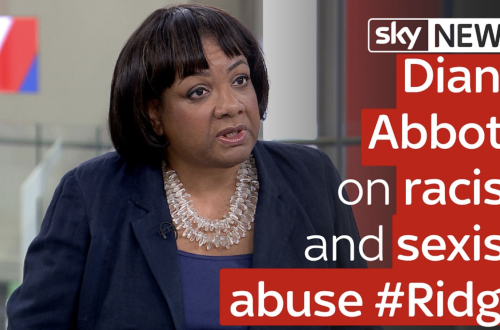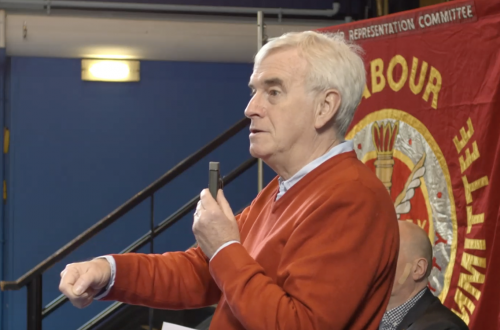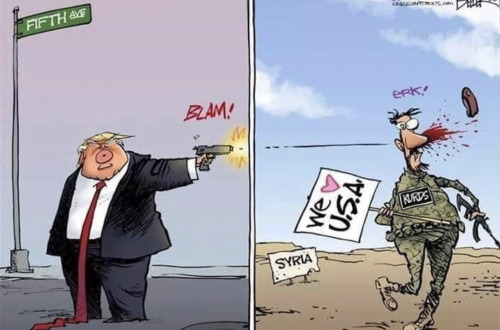This is a guest post from LibertyPhile
Did the HP commentariat miss the point? Did the authors of that video Sarah wanted us to see get so excited with the medium that they neglected the message?
At least a third of the names they list (25 out of 62 by my estimate) of those they think worthy of expressing opinions about Islam, in contrast to all the bigots, do-gooders, trouble makers and the ignorant, are scholars noted for their part in higher criticism of Islam and the Qur’an.
Were they trying to tell us that Islam will be put in its place only when it is finally subjected to the historical truth?
By accident or design that message is there at the end of their video.
Gunter Luling claims there was an earlier version of the Qur’an consisting of hymns and texts later edited by Muhammad and the early Muslim Community. This idea is supported by the work of Christoph Luxenberg whose research suggests the Qur’an was written originally not in Arabic but Syriac, the lingua franca of the Near East at that time.
In his book “Muslim Traditions” Gautier Juynboll explains his view that the hadiths are mostly late fabrications, and if there are authentic hadiths, it is no longer possible to distinguish them from the spurious material with a high degree of certainty.
It is ironic that the name immediately following John Esposito, that supporter of traditional Islam Saudi style, is that of Gerd Puin, the German scholar who was the first to examine the hoard of Qur’anic fragments discovered in the Great Mosque of Sana’a in Yemen.
He said the Koran is a kind of cocktail of texts that were not all understood even at the time of Muhammad and even within the Islamic traditions there is a huge body of contradictory information, including a significant Christian substrate.
It is even more ironic that 13 of the worthy names listed in the video, are mentioned and praised by one of the video’s star “bigots”, Robert Spencer. Spencer has written a book, called “Did Muhammad Exist?” He doesn’t claim to be a scholar but does an excellent job summarising what scholars have been discovering and saying and gives full credit to them. [Note 1]
In Patricia Crone’s opinion: “There is no doubt that Mohammed existed, occasional attempts to deny it notwithstanding.” She goes on to say (writing in 2008): “The suspicion that the location is doctrinally inspired is reinforced by the fact that the Qur’an describes the polytheist opponents as agriculturalists who cultivated wheat, grapes, olives, and date palms …. but Mecca was not suitable for any kind of agriculture, and one could not possibly have produced olives there.”
Also on the worthy list is Tom Holland who recently got into a lot of bother for apparently saying on a Channel 4 programme that the traditional story of Mohammed and the birth of Islam is supported by no historical evidence.
What he should have said is that the evidence in support of the traditional Islamic account of the early days of Islam is vanishingly small.
What evidence there is supports the view (I do not say “shows” or “proves”) that Islam was little developed, perhaps a simple monotheism, even a “branch” of Christianity, that Muhammad was turned into a universal prophet much later, that the Islam we know today is more a product of the Arab empire especially under Caliph Abd al-Malik (685 – 705) manufactured to suppress rebellion and drive expansion.
The Holland programme was roundly attacked by the Islamic Education and Research Agency (iERA) [Note 2] who quoted various sources which they supposed contradicted Holland. In particular, “Dated Texts Mentioning Prophet Muhammad From 1-100 AH / 622-719 CE” which can be found on the Islamic Awareness website.
They don’t, of course, contradict Holland. Islamic Awareness are unable to produce any evidence that hasn’t already been studied and found wanting. I used one of these sources to check against Spencer’s book. Had he failed to mention and explain anything significant. Yes, he had!
An inscription was found near Mada’in Salih in north-west Saudi Arabia, and it says:
‘In the name of God, I, Zuhayr, wrote this at the time when ‘Umar died, the year twenty-four’.
A good and up-to-date source is Robert Hoyland (Professor of Late Antique and Early Islamic Middle Eastern History, New York University.) Hoyland is on the list of worthies. He is also sometimes mentioned respectfully by supporters of the traditional Islamic account such as the iERA and Inayat Bunglawala.
In a his paper “New documentary texts and the early Islamic state” Hoyland says: “It seems all but certain that this refers to the caliph ‘Umar, second ruler of the Muslim polity, since 24/644 was indeed the year of his death and it is hard to imagine any other ‘Umar being famous enough to be alluded to thus without the need for any further clarification. And yet the absence of any epithet or title is striking. But what was the nature of ‘Umar’s office, and of the early Islamic ruler in general?”
One of the reasons given for the lack of Muhammad and traditional Islamic sayings in the very early record is that the Islamic state was decentralised. Hoyland says of this idea “the reticence about the religion of Islam in the documentary record of the first sixty or so years of the Muslim state …. did not result from a lack of state power.”
I believe “historical truth” is the most important issue of all concerning Islam. It resets all the other issues; freedom of speech, freedom of religion, apostasy, pluralism, jihad, gender equality, sharia, veils and hijabs, secularism, and others.
Christianity has been subjected to the historical truth (an ongoing work some will say) and people still become Christians. And now for the majority the belief that Jesus did not walk on water or rise from the dead is not a big problem. And it doesn’t matter if you can’t get your head around the idea of “God the Father, God the Son, and God, the Holy Ghost”!
I would like to leave the last word to Moses.
NOTES
[Note 1] In a section entitled “Standing on the Shoulders of Giants” Spencer mentions Goldziher, Jeffery, Lammens, Margoliouth, Mingana, Noldeke, Schacht, Crone, Cook, Luxenberg, Luling, Nevo, and Wansbrough. He also mentions Sprenger, Wellhausen, Bashear, Warraq, Koren, Popp, Rawandi, Powers who are not on the video’s list of worthies.
Spencer goes on to say “Some of the bold scholars who have investigated the history of early Islam have even received death threats. As a result, some publish under pseudonyms, such as those who go by the names Christoph Luxenberg and Ibn Warraq. Such intimidation is an impediment to scholarly research that even the most radical New Testament scholar never had to deal with”.
[Note 2] From the iERA website: “iERA is an international dawah organisation committed to educating and informing humanity about the truth and noble message of Islam. Our work is focused around creating a mass movement in dawah, on a scale that would be unprecedented in modern history.
The iERA website also gives a list of its Advisors which includes Zakir Naik and Bilal Philips both banned from entering the UK by the Home Secretary.
ANNEX
The experts listed in the video are: Anderson, Arberry, Bell, Caetani, Casanova, Conrad, Cook, Crone, de Goeje, Donner, Esposito, Gibb, Gieger, Goldziher, Guillaume, Hamdan, Hawting, Heidemann, Hodgson, Holland, Horovitz, Houtsma, Hoyland, Hurgronje, Jeffrey, Juynboll, Kirby, Kohlberg, Lammens, Lewis, Luling, Luxenberg, MacDonald, Margoliouth, Marx, McAuliffe, Meri, Mingana, Muir, Neuwirth, Nevo, Noldeke, Noth, Peters, Puin, Retso, Reynolds, Rippin, Rodinson, Rosenthal, Rubin, Ruthven, Schacht, Schmidt, Schoeler, Schwally, Sinai, St. Clair-Tisdall, van Donzel, Wansbrough, Watt, Wensinck.


